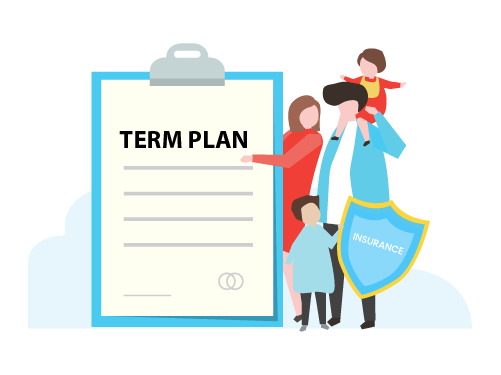Continuing the Knowledge Series- Today we are going to cover the Topic on Term Insurance. The demise of the breadwinner can be Traumatic and as well as, it can be a loss of income for the family. But term insurance can act as an income replacement tool for a family.
Today’s Topic: Points to consider while buying term insurance
The tax benefit should not be the only factor to consider while buying an Insurance Plan. A Term Insurance plan acts as an income replacement tool for a family when the primary earner dies. The importance of having a term insurance plan is such that one should buy it before investing in any long-term goals.
And, as the premium of a term insurance plan is low compared to endowments or unit-linked insurance plans (Ulips). However, while looking for a term insurance plan, premium should not be the only thing to look at. If the term insurance plan has been bought with an adequate sum assured (life cover) and for the right tenure, it will help the surviving family members maintain same standard of living when the breadwinner dies.
Here are a few important points one should consider while picking a term plan:
- When to buy: It’s a misconception that only married people need insurance. In fact, life insurance is a necessity for anyone who has financial dependants. So, even unmarried children where parents are dependent on them need to have adequate life cover. In addition to the basic life insurance amount, one needs to add cover as and when liabilities increase. Add cover when there is new addition to the family or when a big-ticket loan such as home loan is taken.
- How much Sum Assured: This is one of the most important factors while buying the Term plan. One should calculate the Sum Assured basis ‘income’ that one earns rather than on the ‘expenses’. As a thumb rule, one could buy a life cover equal to at least 10 times of the annual income but Insurance company gives it in the range of 25times to 5times, basis age slabs.
- Will one plan be sufficient: Ideally, one single term insurance plan should be enough. However, your insurance needs are not constant all throughout your life. The requirement starts increasing once you get married, have kids and start taking loans. One may, therefore, split the total amount of cover into one or more policies. As and when one’s liabilities are over, one may drop one plan by stopping to pay its premium. Buying a separate cover for liabilities, such as a home loan, and can be terminated when the loan is over. As a fair practice, you should disclose the details of existing plans while buying a new policy from another insurer.
- Should a rider be added: Merely having a life cover may not be enough. A policyholder may become disabled due to an accident or otherwise, thus impacting his or her earning capacity. Failure of making timely premium payments towards the policy may render it inoperative and the objective of buying the policy will not be met. Also, there may be hospital-related costs during the tenure of the policy. Riders are additional benefits in a life insurance policy and are optional and they may or may not be attached to the primary policy. When attached, they come into play on the occurrence of a specific event and provide a financial cover over and above the basic sum assured.
Few common riders are – Accidental Death Benefit, Accident and Accident Disability Benefit, Waiver of Premium, Income Benefit on Accidental Disability and Critical Illness. Adding a rider may help you customize your life insurance policy.
- 5. Tenure: The next important factor is to decide the tenure, Insurers offer different terms and it can go max up to 99 years. But one can opt the policy with lesser Term also and it should be decided basis the liability/pending liability years. Longer tenure will fetch you a higher premium and vice versa.
- Type of plan: In addition to a plain vanilla term insurance policy, insurers have started offering term plans with Return of Premium options also. This ROP could be a good option, where client is looking for some lump sum amount on maturity, if he/she is alive at the end of the policy term. One should review his needs/liabilities every five years and take corrective measures/ plan, basis current conditions (plain vanilla-with the lowest premium or ROP with Matuirty value- with higher premium).
- Which insurer: Insurance being long-term contracts and merely looking at the claims settlement ratio, may not help much, as it will keep changing over the years. One should also consider the Servicing and the Premium rates, before coming to any conclusion. Otherwise, all insurance companies are regulated by the Insurance Regulatory Authority of India (IRDAI), who not only keeps a close watch on their financials but also on their solvency margin, i.e., the ability to pay up the dues when they arise.
- Filling of form: Try to fill up the application form on your own, rather than somebody else do that. This makes you aware of the things that the insurer wants to know before they underwrite the insurance cover to you. Ensure that you disclose all material information such as existing ailments and current medication, family history, your smoking habits etc.
- Nomination: Nomination is the most important part of the policy and nominee must be aware of the insurance cover/policy (opted) and where the policy documents are kept. One way to make sure the proceeds go to the intended beneficiaries is when the insured endorses the policy under the Married Women’s Property Act(MWP).
Buying life insurance merely to save tax could be financially damaging, I will request to keep these factors in mind while selecting a Term plan.

